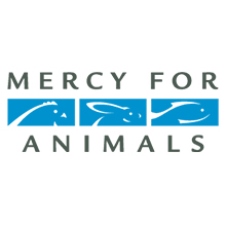 Post written by Kayla Kutzer (J.D. expected 2017, Elisabeth Haub School of Law at Pace University)
Post written by Kayla Kutzer (J.D. expected 2017, Elisabeth Haub School of Law at Pace University)
Mercy for Animals (MFA) is a non-profit organization that engages in domestic and international animal advocacy. It conducts undercover investigations to uncover abuse and neglect on factory farms. MFA then uses this information in litigation when it attempts to prosecute responsible parties for these offenses. Further, it engages in outreach and education to raise awareness about farmed animal abuse and encourage consumers to make more compassionate food choices. MFA promotes vegan and vegetarian diets and lifestyles.
The site’s homepage provides a link to an undercover video filmed on a factory farm as well as background information on the organization. There are links to information regarding MFA’s main mission including recent litigation and vegan diet support. “The Problem” page delves into the process of factory farming with imagery and descriptions of common practices, statistics, and individual animal’
s stories. On the “What We Do” page, visitors can learn about the work and various programs carried out by MFA. Further links are included on this page to learn more about undercover investigations, legal advocacy, corporate outreach, and education.
The “Undercover Investigation” page contains videos depicting abuse and neglect on factory farms. The “Legal Advocacy” page is especially interesting and informative; it contains descriptions of cases, current legislation with a spotlight on ag-gag laws, statistics regarding MFA’s cases, as well as links to current and recent cases. The “Corporate Outreach” page provides information on factory farming practices and implementation in corporations as well as MFA’s major outreach campaign successes. The “Education” page contains links to guides, videos, social media outlets including Facebook, Twitter, Tumblr, Instagram, and Pinterest, as well as other sources of self education and educational outreach regarding factory farming. The remaining pages include links that encourage site visitors to donate, shop, and get involved as well as to learn more about MFA’s successes and its employees. There is no search feature built into the main site, but the MFA Blog contains an internal search engine. Likewise, the site does not have an RSS feed.
MFA’s website is a vast and useful source of information for students, attorneys, animal advocates, and anyone interested in learning more about compassionate food choices. The organization clearly encourages vegan and vegetarian diets and lifestyles and its website is definitely steered towards this goal. The “Legal Advocacy” page in particular is helpful for law students, attorneys, or anyone interested in animal protection litigation looking to gain a better understanding of the animal rights movement from an advocacy perspective with a focus on public policy. The aforementioned page is probably the most objective page on the site as it features information regarding cases and litigation much more so than videos or statistics designed to persuade visitors to adopt a cruelty-free diet. The links regarding cases redirect to the MFA Blog where visitors can read about current and past litigation.
It seems that every highlighted case is a success or one that comes out in favor of MFA. It would be useful to see some of its struggles or perhaps some cases that it lost to better understand both sides of the argument. The case summaries are rather anecdotal in nature and do not include much beyond the basic facts of the case and the outcome. Likewise, at the end of each case, the organization includes information about vegan and vegetarian diets and lifestyles. This style, at times, makes the page feel more like an advocacy site than a legal one.
Because there is no search feature on the main page itself, visitors can use the tabs located in the drop down on the upper right hand side of the page to navigate the site and can click on any of the many links to get to other pages or access outside sources. The search feature on the blog is very helpful when searching through MFA’s many cases. Both sites are laid out very well with clean lines, clearly defined clusters of information, and constantly changing links. The main site would definitely benefit from an internal search engine, but visitors can certainly manage without it due to the easily navigable nature of the site.